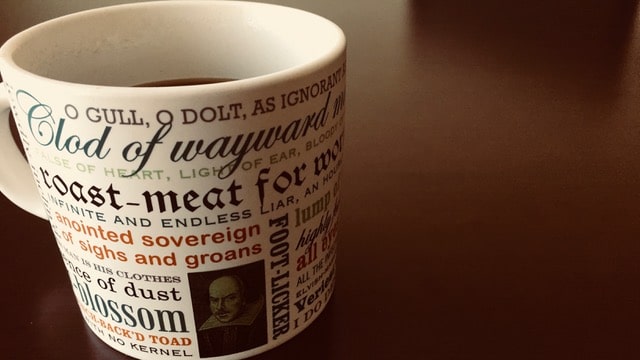
“I say yes, you say no, you say stop, I say go, go, go.”
That’s Paul. Here’s Will’s way: “The evil that men do lives after them. The good is oft interred with their bones.”
McCartney rocks and Shakespeare roles and both showmen move their audiences with antithesis. Steal a gift from Paul and Will. Use antithesis in your writing.
Shakespearian director and scholar Barry Edelstein calls antithesis a “clash of opposites.” He notes in his book, Thinking Shakespeare, that the Bard used the rhetorical device so often, it’s difficult to read a page of his without encountering it.
I come to bury Caesar, not to praise him. The evil that men do lives after them. The good is oft interred with their bones.
…Julius Caesar (3.2.80-82)
Now is the winter of our discontent Made glorious summer by this sun* of York.
….Richard III (1.1.1-2)*Edward IV’s badge displayed 3 suns/a pun on son
Edelstein implores actors to bring out these opposites for the audience to better understand the thoughts of the speaker. It’s not just the exact words the actor must “hit” on, it’s the entire thought.
Shakespeare’s teeter-totter treatment of words comes in a variety of ways: sometimes using the same words; sometimes within the same lines; sometimes between many lines. Yeah, that Shakespeare guy was a pretty good writer because he worked at it…and he used a plethora of rhetorical devices. Antithesis was one.
Shakespeare was not a genius. He was, without the distant shadow of a doubt, the most wonderful writer who ever breathed. But not a genius. No angels handed him his lines, no fairies proofread for him. Instead, he learnt techniques, he learnt tricks, and he learnt them well.
— Mark Forsyth (The Inky Fool) The Elements of Eloquence…Secrets of the Perfect Turn of Phrase.
Edelstein notes there’s a depth to the meaning actors can express by relating the complete antithetical expression. Is there depth in the pop treatment? Well…
Paul is a pretty good lyricist (and part of a pretty decent band), based on stacks of golden wax; however, John apparently wasn’t a big fan of “You say Goodbye, I say Hello.” The Beatles’ fans liked it enough to make it a chart-topper for 3 weeks in 1967. It recently jumped out of my radio when antithesis was holed up inside my head. Serendipitous. N’est-ce pas?
I say high, you say low You say why and I say I don’t know, oh no.
You say yes, I say no You say stop, I say go, go, go, oh no…
Antithesis is everywhere in pop music…not just bright Paul and dark John (lyrically). Mark Forsyth cites several examples of antithesis from Oscar Wilde, Charles Dickens, the Bible, and Katy Perry (Hot N Cold).
You’re hot then you’re cold. You’re yes then you’re no.
You’re in then you’re out. You’re up then you’re down.
Okay, it’s not Shakespeare, but then again…who is? (That’s rhetorical, no matter how much you like Bacon).
“The 2020 Election Offers Low Spirits and High Comedy.”
—Wall Street Journal 9/18/20 Joseph Epstein
If anthesis works for Paul, Will, Wilde, and the WSJ, it works for me. Does it work in this recruitment ad?
Antithesis is one way to work the language. I say yes, you say….
- Derby Cars and Critics Both Race to the Bottom. But Your Leadership Must Not. - October 5, 2023
- Are you overlooking something that’s holding you back? How my “aha!” moment could help. - September 14, 2023
- What Spartan Women Can Teach Us About Advertising - October 12, 2022

